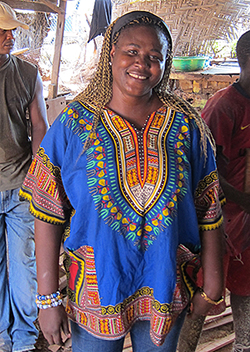
The Goldman Sachs 10,000 Women program, which was featured in “Half the Sky,” proves many times over the value of investing in women, and of Goldman Sachs’ commitment to doing so. In 2008 it launched the five-year, $100 million investment to promote economic growth opportunities by providing 10,000 underserved women entrepreneurs with a business and management education, access to mentors and networks, and links to capital. Having just entered its fifth and final year, the program has reached women in 43 countries, bringing invaluable business training to women who likely would never have had the chance to learn the practical and personal skills necessary to become a successful entrepreneur.
Performance data on its impact has already been released and the results are promising. A 2012 assessment of the 10,000 Women program in India conducted by the International Center for Research on Women (IRC) reported impressive results, with half of the graduates of the program at least doubling their businesses’ revenues since participating.
But the high success rate of economic empowerment programs in growing economies like India’s is not entirely surprising. The greater test for 10,000 Women and for other economic programs is whether they can have an impact on the lives of women and local communities in countries with sluggish economies. And this is what makes the 10,000 Women program so bold in its approach: it did not confine its programming to select countries already trending towards economic success, where women business owners – while still challenged – could be buoyed somewhat by the natural economic growth around them.
Instead, it expanded its program to even more challenging countries. Countries where the GDP per capita is $700 USD, ranking among the lowest in the world. Countries where the unemployment rate is as high as 85%. Countries where the devastation of back-to-back civil wars still lingers a decade after peace was declared. Countries such as Liberia.
In partnership with Global Communities, an international non-profit with offices in Monrovia, Liberia and more than 20 countries around the world, 10,000 Women Liberia launched in 2008. At the time, Liberia was still in the early phases of post-conflict recovery after two civil wars that left 250,000 people dead, and another 1/3 of Liberians fleeing across borders. Launching an economic empowerment program here was no small feat.
Despite the unique position of power women hold in the political realm in Liberia – from Africa’s first female president, President Ellen Johnson Sirleaf, to the influential Women of Liberia Mass Action for Peace activist group, which helped remove former president and convicted war criminal Charles Taylor from power – the country’s women are still struggling for equality and opportunities in many other areas of life.
The statistics are stark: Women make up 54% of the labor force in Liberia, yet 90% of working women in Liberia are working in the informal sector. Nearly 60% of Liberian women of working age (15 – 49 years old) are illiterate, compared to just 30% of Liberian men of the same age group, and 42% of Liberian women have never attended school, as compared to 18% of men. Additionally, almost half of all Liberian women become pregnant by the age of 18, and after years of rape being wielded as a weapon of war, sexual violence against women still remains a perpetual societal problem.
For women in Liberia to rise up from these immense challenges, and be able to live the healthy, safe, and productive lives we all want, empowerment is essential. And this is where the 10,000 Women Liberia program is making a difference. The program has, to date, trained 211 women entrepreneurs. While most women in Liberia work in the agriculture sector, the 10,000 Women program’s participants own businesses in a variety of sectors, from tailoring to beauty salons to export businesses. The program is run out of the capital city of Monrovia, with near daily classes for participants tailored to the specific needs and circumstances of the Liberian market.
The benefits the participants have seen in Liberia have been significant: Eighteen months after program completion, 97% of graduates report an increase in their revenues and 62% have been able to hire new employees. And perhaps most promising, the program’s benefits in Liberia have extended beyond what can be seen on a balance sheet. Participants are able to see and feel the program’s impact in their work, family, and personal lives:

Idell Blake Johnson (Photo: Global Communities)
Idell, a 2013 10,000 Women program graduate, was always interested in woodwork, and she had a small woodworking business that opened in 2007 before the 10,000 Women program, but she wanted it to be bigger, to do more things and to be more profitable. Her dream was to bring more women into the business and encourage them to be at the top of the woodwork business since she is in the minority, and since men still largely dominate the business. She said she knows the program can help more people like her because previously she had a low salary and now she’s doing very well. She adds that being self-employed and being able to employ others also helps reduce the high unemployment rate in Liberia.
With the 10,000 Women program now in its final year, the focus turns to expanded evaluations and assessments in order to determine its overall impact. Goldman Sachs hopes now that learnings from the program will be shared broadly so that other organizations can create and expand successful economic empowerment initiatives, and that the program’s impact will continue for years to come. Even before all the numbers are crunched, though, there is little doubt to women in Liberia that 10,000 Women has had a lasting, positive impact.
Perhaps no one said it better than program alum Geneva when asked about the biggest lesson she’s learned: “Don’t give up on yourself, despite your little beginnings.” If this will be the legacy of the 10,000 Women program, then it can already be considered a success.